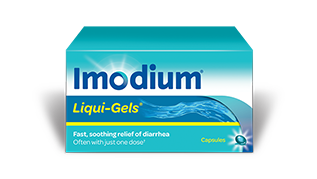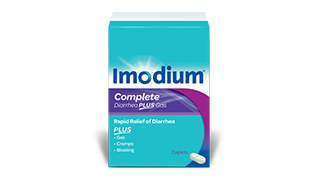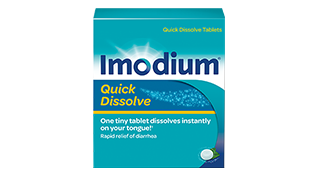Frequently Asked Questions about Diarrhea
Everyone is susceptible to diarrhea at some point.1 From its causes, to its symptoms, you can learn more about how to help control diarrhea.

The following are some frequently asked questions (FAQs) and corresponding answers.
If you have a question about IMODIUM® products, please read through our FAQs or contact us.
Diarrhea is a term describing loose, watery stools. Having diarrhea means passing loose stools three or more times a day.1
When your digestive system is in its normal rhythm, food and fluid pass regularly from the stomach into the small intestine.27 Food is then broken down and nutrients are absorbed along with most of the fluid. The remaining waste and some water pass into the colon (large intestine) where more water is absorbed. Finally, the waste is passed in the form of stools.27
During a bout of diarrhea, the intestinal movement can become overactive, and less fluid is absorbed back into the body.10 The result is loose or watery stools, commonly known as diarrhea.1
A number of factors can cause diarrhea – these may include infections, foods, drinks, medications, travel-related illnesses or certain medical disorders.
Here are some common factors that could cause diarrhea1,23,25,29,38,44,48:
Stress. Are you going through a particularly stressful period? Stress can have an influence on gastrointestinal function and can be a trigger for diarrhea.
Food Intolerance. Knowing your ‘trigger’ foods, drinks and/or eating habits provide an important means of limiting the incidence of diarrhea. It’s to your advantage to keep a food diary to better understand how your body responds to what works and what doesn’t.
Menstruation. Women can experience diarrhea and abdominal pain around (before and during) their menses.44
Gastroenteritis. This is an inflammation of the stomach and intestines caused by an infection.23
Norovirus. This is a viral infection that leads to gastroenteritis. Eating or drinking contaminated food or drink can lead to gastroenteritis and associated diarrhea.25
A bout of diarrhea can be a very uncomfortable experience – but you can take steps to help relieve it.
IMODIUM® products contain an active ingredient called Loperamide, which works by slowing down the movement of fluid through the gut.3 This allows for overall greater absorption of valuable fluids and salts back into your system and treats diarrhea symptoms. Please refer to product labeling before use.
Here are some things you can do if you contract diarrhea
A key step is staying hydrated by drinking plenty of fluid. Consider using an oral rehydration solution, which generally contain a specific mixture of salt, glucose and water.39
Avoid foods or drinks that are caffeinated, greasy, high in fiber or high in sugars or sweeteners.2 These may worsen your diarrhea. As you start feeling better, you may introduce bland foods such as banana, plain rice, baked potatoes and crackers back to your diet. Remember that while reducing the intake of certain foods during an acute episode may be necessary, it is best to return to a normal, balanced diet as quickly as possible.2
Although IMODIUM® stops diarrhea, it will not treat the cause of it. Whenever possible, the cause of diarrhea should also be treated.
A prescription is not required. IMODIUM® products are widely available over-the-counter in drug stores and supermarkets.
Many people think diarrhea is a sign that your body is trying to get rid of something, so it’s better to let it ‘flush’ any bacteria or toxins out of the body. Although acute diarrhea usually resolves on its own within a few days, you can get rapid relief with IMODIUM® products. Speak to your physician if you have any questions or concerns.
If pregnant or breast-feeding, ask a healthcare professional before use.
IMODIUM® products are not recommended for children under 12 years of age except on the advice of a doctor. Children with diarrhea can become dehydrated more quickly than adults, so it’s a good idea to keep a close watch and ensure proper hydration. You may give your child an oral rehydration solution, which you can find in soluble formats to help with dehydrations.40 Contact your healthcare professional for the proper dosage. Oral rehydration solutions replace lost fluids and salts and help prevent dehydration, but they don’t relieve the symptoms of diarrhea.40,58
Here’s some advice for treating your child’s diarrhea:
Avoid sweetened beverages like soft drinks, energy drinks, sugar water and undiluted fruit juices.2,42 These all contain sugar that draws water into the intestine and can make diarrhea worse.42
Try to return your child to their regular diet as soon as possible.40
Consider offering your child yogurts that contain live or active cultures.1
If your child’s diarrhea lasts longer than 48 hours, or gets worse – or you’re otherwise concerned about his or her health, consult your healthcare professional.
IMODIUM® products work by changing the movement of your intestinal wall to help slow the movement of fluid through the gut.3 As a result, there is greater overall absorption and a decrease in a stool volume.
While IMODIUM® products work to help stop diarrhea, the rate of associated constipation is low. Less than 3% of participants in clinical studies experienced constipation as result of taking IMODIUM® products to treat their symptoms.
If you have IBS, speak to your doctor or healthcare professional regarding appropriate medication(s) to treat your symptoms.
Some eating habits can trigger diarrhea or other digestive issues.
Here are some general good eating habits for overall digestive health:
Eat more slowly. It takes about 20 minutes for your stomach to tell your brain it’s full.31 Eating more slowly gives you time to feel full, so that you’re less likely to overeat.
Chew your food. When you take time to chew your food properly, you not only slow down the eating process, but chewing also breaks food down into smaller pieces and mixes it with saliva to start the digestive process.32
Don’t gulp it down. When you gulp down food, you swallow air, which can lead to trapped gas and poor digestion.33
Eat smaller, lighter meals. Big, heavy meals take longer to digest and make your system work harder.7
Don’t eat right before bed.34,35 Try to avoid lying down for two hours after eating to help avoid acid reflux.
Avoid alcohol. Drinking alcohol can cause diarrhea with some people. This can happen with occasional or long-term use.8
Stress can affect anyone. Many of the body’s systems are affected by stress. If you are experiencing mental stress, you may experience symptoms such as diarrhea, heartburn, nausea or vomiting.38
IMODIUM® Complete caplets work quickly to relieve diarrhea, while also soothing painful cramps, uncomfortable bloating and gas. It contains an additional ingredient called Simethicone, which helps to ease excess gas in the intestines and relieves bloating and pain due to gas.
Some women experience diarrhea that occurs monthly in relation to their periods.19,44 If you’re one of them, rest assured you are not alone. Hormonal changes taking place during your period may be the cause of menstrual-related diarrhea.45,46,47
IMODIUM® Calming Liquid can provide you with fast and effective relief from diarrhea.
IMODIUM® Quick Dissolve tablets are specially formulated to dissolve instantly on your tongue, so you can get rapid relief from diarrhea without the use of water. Perfect for when you’re on the go or traveling.
Everyone’s different – which makes it difficult to identify the causes of your frequent diarrhea. For some, it could be what they eat: a trigger food or intolerance. For others, it might be a viral or bacterial illness, a reaction to stress, a result of taking certain medications or as a result of having a period.19,22,38,39,43,44 It’s good to gain a better understanding of factors that can cause diarrhea to help manage your diarrhea accordingly.
Our Manage Your Diarrhea section is full of tips and advice to help you watch out for triggers and, improve your digestive health so that you can hopefully avoid the next occurrence of diarrhea.
If you have longer-lasting or persistently recurrent diarrhea, it might indicate an underlying medical condition. If so, you’re advised to consult your healthcare professional.
Norovirus is the leading viral cause of gastroenteritis and a common cause of diarrhea, as well as vomiting. (Gastroenteritis is an inflammation of the stomach and intestines). Norovirus is very contagious and can spread quickly if you don’t wash your hands regularly.23,25,48,49

IMODIUM® LIQUI-GELS®
IMODIUM® LIQUI-GELS® provide you with the fast, soothing relief of a liquid to settle things down and restore your feeling of harmony.

IMODIUM® Complete
IMODIUM® Complete is the first and only anti-diarrheal solution with a unique, dual-action formula designed to effectively relieve diarrhea PLUS painful cramps, gas, and bloating.

IMODIUM® Quick Dissolve
IMODIUM® Quick Dissolve tablets dissolve instantly on your tongue for fast, effective relief of diarrhea.